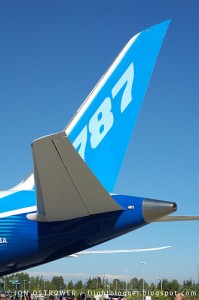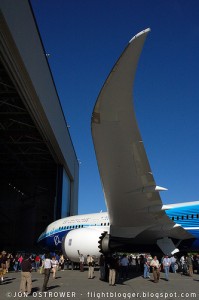
Tail of the Boeing 787
It has been hard to think about this with an outside perspective. I grew up in the Seattle area; I remember as a child driving by the large hangars in Everett, hoping they would be open so I could sneak a peek at what they were building. I recently bought a house and was delighted to find out it was on one of the flight paths for the airport where Boeing builds the 747, 777, and 787. Recently I was lucky enough to catch a Dreamlifter flying overhead, which others might find as a negative, but as an aviation nerd, I love it!
Due to my attachment to Boeing as a local company, my initial reaction to Boeing choosing South Carolina for their 2nd assembly line for the Boeing 787 was shock. How could they? Of course, many on the local media felt the same and you could see the anger and disappointment. There was a lot of blame. Some said it was the union. Others said that local government wasn’t doing enough. Others said the move of Boeing’s headquarters to Chicago should have been the warning sign.
But after taking some time and reading a lot about their decision, I have to say I understand it. I realize why Boeing made this decision and it is not just one factor. Here are the reasons I feel it might have been a wise choice:
* Cost of living: The Seattle area is well known for having a high cost of living. We have a lot of big companies housed here: Boeing, Microsoft, Amazon, and Starbucks, just to name a few. Along with these big names come big paychecks. For Boeing to keep qualified workers in the Seattle area, they have to pay them higher wages. Charleston doesn’t have the high cost of living that Seattle does.

Wing of the Boeing 787 Dreamliner
* Less environmental concerns: Seattle would like to say it’s a green, environmentally friendly city. Even though no city would want to admit they aren’t, Charleston and South Carolina don’t have the environmental restrictions that Seattle and Washington state have.
* No union labor force: Boeing workers in the Seattle area have grown large unions. These unions have helped many workers get the rights and pay they have today, but unions can take a big chunk out of Boeing’s bottom line. The unions have gone on strike multiple times in the Seattle area, causing billions in loses. By using a non-unionized workforce in Charleston, Boeing doesn’t have to worry about their workers going on strike.
* Moving global: Boeing has created a global supply chain that makes needing all production in the same place obsolete. Of course some can argue this new global supply chain has caused some of the delays for the 787 Dreamliner, but it is most likely the future model of airplane construction.
* Defense contracts: Boeing doesn’t just build commercial airliners. They have multi-billion dollar defense contracts. To help them keep these contracts, they need to spread jobs and production across the US as much as possible.
This doesn’t seem like a quick decision on Boeing’s part. With plans to start construction next month and planes to be completed by 2012, one can only assume that they had their mind made up for quite some time. Most who work on the current 787 line in Everett feel cheated. However, this might be a great opportunity to show they are the best and they are worth the extra money. Boeing will soon be looking at building a replacement for the Boeing 737 and 777 and the union and workers have the opprotunity to show that Everett is the right place for Boeing to build. I believe that is true and I hope Boeing will be able to see this in the future.
Although I like to think of Boeing as this place that creates wonderful flying machines, they are a business and need to do what is best for their future. I hope that Boeing can see that no one other than the Boeing workers in the Seattle area can build a better plane!
follow us via | web | twitter | email | rss |
Images: Flightblogger